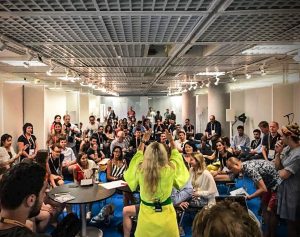The topic of my work and many people’s attitude towards it returns like a boomerang in the conversations that I have.
I remember what happened after my last voyage. I couldn’t imagine a better return: flowers at the airport, gifts, e-mails, phone calls, meetings… I had a really soft landing.
It’s easy to distinguish how close someone is to me based on the type of questions that they ask me.
Friends and co-workers: “How was it? “Have you seen anything interesting?” Did you get some rest? Or did you constantly sit in front of your computer?”
The answer is easy. Smolna (the contemporary seat of Izmałkowa Consulting) was working brilliantly. My life is directly proportional to the quality of team work in the office, so it was better than good. I saw things, I rested, I sat in front of my computer – everything according to plan.
Acquaintances and business partners: “How was it on vacation?”
Obviously I could bite my tongue and give them the answer they expect from me. But if someone knows me a bit, they know that biting my tongue is not the skill that I’ve mastered. That’s why I lost count of how many time I had dialogues like the one below during the weeks that followed:
“I wasn’t on vacation.”
“But you were absent for half a year?!”
“Four months, not half a year. Besides, like I already said many times, I WASN’T ON VACATION.”
“So where were you?”
“I was at work, but in various offices.”
“Oh, come on! You can write things like that on your blog or tell this to your new clients. It’s not like we’ve just met. Why all this pretending that it’s work? I actually even like you more for being able not to work.”
“BUT I WORK!!! Am I supposed to lie because it doesn’t fit other people’s idea of work?”
“What kind of job is it?! I mean, what kind of job is pleasant and lets you sip mango juice?! Life couldn’t be any better.”
Like I’ve already written in the text about the real life – I’m under the impression that people have a really simple definition of work.
For them, work = constant rhythm (routine and predictable work) + mixed feelings (with slight dominance of resentment and dissatisfaction and occasional desire to hang oneself on one’s own belt).
So, if one of these elements is missing, the formula doesn’t add up. If you love you work – it means that’s not work at all. If you work outside of office – that’s not work either. It seems that the indispensable part of work is avoiding it and dreaming of a change.
In such situations I wonder what is it exactly that disturbs people more in my story: the fact that I like what I do or the way I do it?
I really know and meet during my travels A LOT OF PEOPLE who love their jobs!!! I don’t accept the idea that they’re just exceptions. Perhaps they are in the vanguard, but they’re not exceptions!
I believe that someday more people will open their minds to a different definition of work, to the possibility that it can give joy, that one can like Mondays and not differentiate between work and not-work. Perhaps more people will be content then and a lot less will be of the complaining sort.
We choose our own interpretation and definition of work ourselves. In case of mine, having a dislike for work and avoiding it is a temporary element that appears sometimes but always has to go away. Yes – sometimes I am tired, frustrated and I wonder if everything that I do has any sense and when it’s going to end. Sometimes I want to throw it all away and go to Mars. I want to curl up under my duvet and pretend I’m not there. But then I finish a report, I have a presentation and later, after returning home, I sit down exhausted, drink white wine for a good night’s sleep and think: “God, it’s so good that it all went so good! What was all the drama for?!”
Everyone has moments when they don’t like something, to say the least. They want to change something, leave it or forget it. But the most important thing is whether, in total, it is the positive or negative emotions that are dominant. To me it’s plain mathematics.
I accept the moment of not liking my work on condition that at the end of the day I wouldn’t want to be doing anything else anyway. And I’m sure that there are more people like me. I know it because I constantly meet them.
Probably birds of a feather flock together 🙂
My former boss said that a strategist is working even when not working because they draw inspiration for further work. At first I wasn’t exactly able to understand it, but it came on its own when I started to be knowledgeable and able. When I work, I’m in task mode. And in situations when I’m in contact with something totally different, I get filled with knowledge and inspiration without even trying. I had to grow up and trust that there would come a moment when this knowledge would present itself. The knowledge that everything can be useful and that you have to be open and aware.
Living in the Tar Amor community in the Brazilian Amazon rainforest was one of the most inspiring periods of my life. I met there many families who travel with little children and educate them by means of those travels. I saw how a child develops without the media, what features of character it develops and what it pays attention to.
It was not “useless” knowledge – they taught me how to make dreamcatchers and, while doing that, they told me the story of the culture of natives living in this area, drawing attention to the role of rituals in their lives.
We visited many small communities, each consisting of less than 100 people. I have to say that few things started up my imagination so strongly with regard to future trends as observing how people who used not to have electricity a few years back suddenly receive access to the most modern technology – they installed a radio and received first computers. Or how a mother and her little daughter learn for the first time to type on a computer and how the Internet changes the perspective and the way of thinking.
Visiting matriarchal societies provided me with a great deal of knowledge on the strength of women who have no idea of notions such as “feminism” or “liberated women”. Their stories about how they associated women from various tribes in order to survive during bad harvest injected me with lots of energy. Further needs initiated activity and returning to the mother culture – young women who already forgot how to make baskets or leaf jewellery were asking the oldest ones to teach them those forgotten skills. They noticed that it’s the thing that the tourists ask most often about.
Meeting Marian, who has been saving turtle eggs for 17 years, totally for free, just because he loves turtles and his land, taught me a lot about social dedication to loyalty.
I had everything that we use during our creative studies given to me in a natural way – a group of totally varied people (from waitresses through biologists, fashion photographers, war journalists, politicians and professors of economy) and a mixture of various opinions, knowledge and experience. It was better than the best workshop and took a week, not three hours. The most important texts of mine were created in the Amazon rainforest.
In Colombia in the Guajira desert my mind was operating in high gear. Electricity was available only for 2-3 hours a day, but there were exceptions even to that. So I had to both think and write quickly. Usually I think when I write and there I learned to write whole articles in my head in order to type them down quickly whenever the green light of my computer’s power supply activated.
I also think that it’s easier to work in beautiful surroundings – faster, more intensely and more creatively. One of my most beautiful “offices” was in Greece.
Additionally, I think that the office itself should be a bit like its owner in order for them to feel good there.
Both the looks of our office and the time we spend together is exactly the way all of us like it. It was one of us who suggested participating in a charity run and we decided to enjoy it together.




